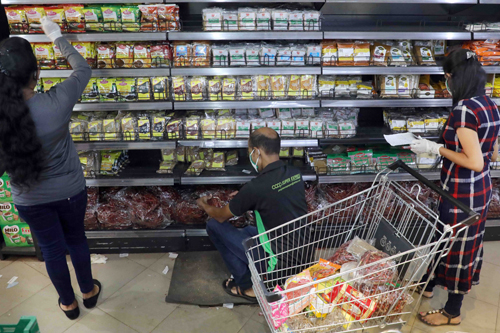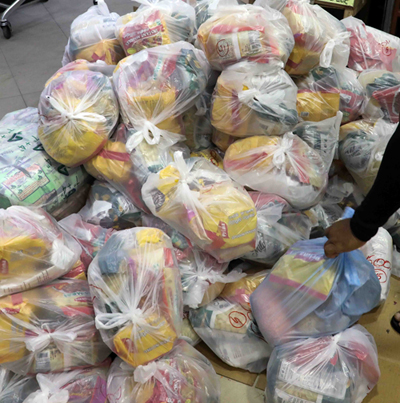Back to the basics for Sri Lanka

Staff at the Coop store at Minuwangoda preparing deliveries ordered through an app. Pix by M.A. Pushpa Kumara
The coronavirus has offered an opportunity to mankind, and particularly to Sri Lankans, to sit back and think whether the so called “development path” hitherto followed is correct and sustainable.
While understanding the gravity of the situation, and wishing those affected a speedy relief, it may also be worth reflecting that the least affected are those who have a greater degree of self-sufficiency in their lifestyles and livelihoods. The bloated up balloon called “market” has been burst, and that “invisible hand” – conventional neoliberal economists venerate as a “divine force” – has truly gone “invisible”.
Those who were living beyond their means are being forced to come down to earth. There is no assurance that these sorts of collapses in the international trade flows would not happen in the future, not only for reasons of epidemics, but also for other disturbances such as conflicts or wars. Therefore, Sri Lankans should resolve to revert back to basics — economic philosophical heritage of our own, particularly, (a) simple lifestyle, (b) consumption for existence instead of existence for consumption, (c) economic self-reliance and producing those essential goods/services locally (particularly food, water, clothing, medicine, energy and shelter) to the maximum extent we can, (d) recognise the value of farming, and the strategic necessity that farmers should become rich — this cannot be achieved when we import wheat-flour at such low prices, (e) investment priority over consumption, (f) investment through national savings to the best possible extent, (f) living within our means and not getting into further foreign debt, (g) determining national assets to the benefit of our own, and not for foreigners, (h) re-orienting the public service and state enterprises to make those efficient and to give them a productivity orientation, (i) prioritising socio-economic equality as an essential ingredient of development, and (j) promoting local research, inventions/innovations and technological advancements, particularly in applied industrial/agricultural/service domains.

Food to be delivered.
Recovery will take more than 12 mths
By Shiran Fernando, Chief Economist – CCC
The impact of COVID-19 has been significant on human life so far. The cost on the economy is secondary but important given food security and income for the public. To this effect, we have seen countries globally announcing large stimulus packages targeting relief to the public, workers including low-income workers and firms. We need a similar package so as to ensure, we maintain employment and minimise the damage to firms due to supply chain disruption and slowdown in demand. Sri Lanka unlike countries like Singapore which announced a package close to 11 per cent of its GDP do not have the same level of fiscal space. Hence, we need to look at external debt moratoriums, accessing credit lines from institutions like the IMF and rely on savings from low oil prices to finance the recovery which will be at least 12 months or more.
Courage to survive
By Ruwindhu Peiris, Stax Managing Director and Colombo Office Head
As with all things, this too will pass. While we do whatever it takes to survive this period (however long it may be), Sri Lanka must find the courage and capacity to plan for the come-back. We are living though a global seismic shift where many “new-normals” will emerge. Countries that adapt fast and lead change will take advantage of these.
Three things I hope we can do: 1) As citizens use this indiscriminating experience to cement our national unity. 2) As the public sector, fast track digital adoption and eliminate inefficiencies that have plagued our national productivity. “Necessity is the mother of invention!” 3) As corporate Sri Lanka, be bold and look out for bargain opportunities in global markets and new sectors that will be fastest to recover.
Temporary lay-offs necessary
By Ravi Abeysuriya, business professional
The global economic contraction due to virus suppression efforts will have a far reaching economic fallout in Sri Lanka. This would demand decisive action by the Government albeit limited fiscal space to blunt the economic impact. Targeted (only those who absolutely need get them for identified purposes only) channeling of liquidity to those who have become illiquid such as the daily wage earners, self-employed, businesses that require working capital to survive and banks and NBFIs that require liquidity support is imperative to safeguard the economy. A change of labour laws to allow business to furlough employees (temporarily layoff without pay but with a Government paid allowance) and avoid large scale business liquidation will be required. Austerity measures to curb wasteful expenditure such as import of luxuries including fuel and the public belt tightening will be inevitable.
Address fundamentals
By Hilmy Cader, CEO – MTI Consulting
The economy and businesses both should go back to ‘ground zero’ and re-strategize a sustainable strategy, plans and action – in the new world order that will emerge in the post-coronavirus phase.
There is tendency to offer knee-jerk responses in such situations. Whilst recognising that both the economy and businesses need some form of ‘first aid’ and ‘emergency responses’, it should not be confused with the need to address the fundamentals. It is a good time to engage in deep thinking – based on sound analytics and scenario planning.
COVID-19 has shaken everyone
By Damith Kurunduhewa,
CEO – Strategic Risk Solutions
Once the COVID – 19 crisis ends, the consequent psycho-socioeconomic impact would be critical for us as a country, enterprise, family and individuals. The tremors will shake-up state finances, corporate finances, micro-finances and family finances.
The state needs to look for swift funding drawn into the economy by way of grants, aids, loans and fiscal investments in order to ease-out the looming liquidity crunch. And, revival of the offshore markets that existed – and discovering new markets resulted in the crisis itself are priorities in the recovery map.
Extending state support for the macro and micro entrepreneurial rescue is a vital necessity to set the base for an overall resurgence of commerce.
Simultaneously, corporates need to upscale their disaster recovery and business continuity plans (BCP), while being innovatively flexible to adjust to emerging market windows.
In the next global crisis, Sri Lanka can do better if we can lessen the offshore sourcing dependability and become self-sustaining as much as practicably viable. That requires right conceptualisation, planning, preparation and lots of determination.
Support from lending agencies
By Dhananath Fernando,
COO, Advocata Institute
The Sri Lankan Government must proactively negotiate on a specific timeline with lending agencies such as IMF, World Bank and ADB to reschedule our existing facilities and for a new finance package to mitigate the indicated economic downturn. It is essential to open a dialogue with China, US, India and EU for bilateral lending given the negative outlook to raise debt from the market. Near zero rate in US interest rates in the US provides a good opportunity to restructure our foreign debt.
During the curfew period, the government should abolish price controls immediately which has created shortages of food items in the market where the most economically marginalised segment in the community is the most impacted. Import controls have to be abolished to avoid sending the wrong signals to the market and the government should work closely with the private sector to rapidly expand the testing capacity in the battle against COVID-19.
Reach out to World Bank
By Lahiru Pathmalal, CEO, Takas Pvt Ltd
It would take a herculean effort on the side of the government to revive the economy. I think the measures currently taken so far has kept the COVID-19 recovery working. But it comes at a massive cost to the Sri Lanka economy.
The government will have to reach out to the World Bank, and also negotiate hard with current lenders to cut the debt burden. This has to go hand in hand with an economic rescue package (this will not be possible with the first step). They have to also take steps to reduce debt repayments by individual citizens and business, while looking after the interests of the local banks and financial institutions. If these steps are taken and executed, we can possibly see a recovery happening sooner rather than later.
Be ready with tourism campaign
By Dileep Mudadeniya,
Head of Brand Marketing-JKH
Looking at historical data, two of the incidents that have had the highest impact on the global tourism industry were 9/11 and global financial crisis in 2007/8. The global tourism industry took over 13 months to recover from those two. COVID-19 is much larger in terms of impact and full recovery is estimated to take over 24 months. As per the tourism economics recent report if the current restrictions continue till the remainder of the year then it may take 18 months resolution time which will have an impact of an 80 per cent fall in global travel and same will apply to Sri Lanka too.
Where tourism is concerned two things to be looked in to:
1) Look at short term solution – by supporting the industry via financial stimulus which include a subsidy to pay the salaries of staff and working capital.
2) There will be an immense competition (for tourists) once the situation improves towards the end of the year. Hence complete all procurement and be ready to launch the global marketing campaign towards end of the year depending on easing of current restrictions.
Women worst hit
By Muttukrishna Sarvananthan,
Senior Lecturer, University of Jaffna
In Sri Lanka as well as globally, women are the worst hit by the economic fallout from the ongoing pandemic, COVID-19. This is because women account for the largest proportion of the informal labour force in all the countries (both developed and developing), including Sri Lanka. The informal jobs, including daily wage jobs and self-employment, are the first economic casualty of any natural or human-made disaster such as the current one. The jobs of around one million Sri Lankan women in West Asia and elsewhere are at risk. Moreover, women are at the forefront of the health care of the infected throughout the world, and indeed the carers of children and elderly in their respective homes as well. Besides, there is growing evidence of domestic violence and intimate partner violence against women in their self-quarantined homes and shelters throughout the world, including Sri Lanka.
In order to compensate for bearing the disproportionate burden of the economic and the social cost of the pandemic, I propose that the government should make a one-off cash payment of Rs.10,000 to one female from each family who is not in a monthly paid job either in the public, private, or non-governmental sector and/or who is not in a registered self-employment or business.



